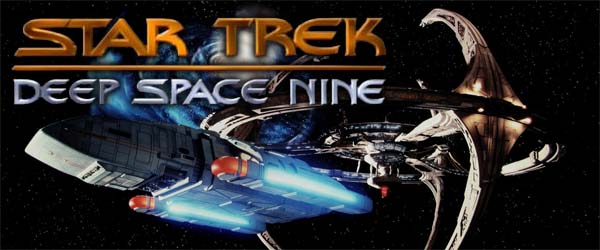
In the age of streaming and binge-watching here in the year 2023, long-form serialized television is now ubiquitous. Every network and streaming service has wanted its own blockbuster TV shows. Whether it's AMC's The Walking Dead and Breaking Bad, HBO's Game of Thrones, Sci-Fi's Battlestar Galactica, Netflix's House of Cards and Stranger Things, History's Vikings, and so forth, it seems that every big new show outside of sit-coms has a heavily-serialized format. Procedural dramas are going the way of the dinosaur.
Serialized, long-form television may be commonplace now, but back in the 1990's, it was virtually unheard of outside of daytime soap operas (such as Dallas and Dynasty) and the occasional network mini-series. At least, this was the case in the United States. British television has a much longer track record of serialized story-telling. A big part of why serialized television was uncommon was that the producer(s) of network syndicacted shows didn't have as much control over when its affiliates decided to air the shows, or how heavily they would market and advertise it. Furthermore, the networks or affiliates could change the time slot of the show pretty much at a whim. Viewership, therefore, would be much more fickle and fractured. Audiences would pop in and drop out. Expecting the audience to have seen every previous episode in preparation for this week's episode was a dangerous and risky expectation for a production studio. It's easy to lose viewers if none of them know what's going on.
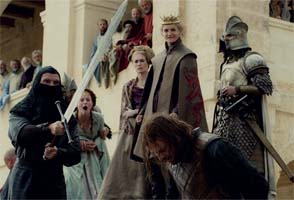 - Game Of Thrones, copyright HBO
- Game Of Thrones, copyright HBO
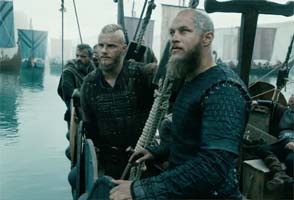 - Vikings, copyright History Channel
- Vikings, copyright History Channel
Highly serialized, long-form drama are the norm for modern networks and subscription television services.
As I mentioned in the previous essay, this was the case with me. I was in elementary school and middle school during DS9's run, and I missed a lot of episodes in the first couple seasons, despite wanting to watch the show. Missing so many episodes meant that I had very little idea what was going on when I would watch, and so I mostly lost interest in the show. If my dad was watching it, and I was there, I'd watch it, but I wasn't planning my day around it.
Looking back now, that sort of serialized story-telling is now ubiquitous and expected, and so it's easier to recognize that Deep Space Nine was truly innovative and ahead of its time in this regard.
Long-form story-telling
Serialized story-telling wasn't alien to Star Trek. Deep Space Nine premiered in 1993, the same year as the sixth season of Next Generation. By this time, The Next Generation had several story threads that had recurred over the course of a season, or over multiple seasons -- as well as several attempted overarching plot threads that were dropped.
As early as the first season of Next Generation, Q had become a recurring antagonist, and his "judgement" over the human race was established as a recurring plot thread. Heck Q's judgement of humanity was originally presented as the framing mechanism for the entire show! It was scaled back in the following seasons due to the general poor reception of the first season, and the fact that John de Lancie just works better in a more whimsical and comic role.
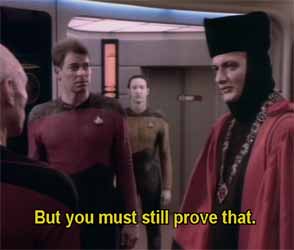 - TNG "Encounter At Farpoint", season 1, episode 1
- TNG "Encounter At Farpoint", season 1, episode 1
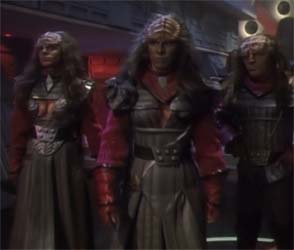 - TNG "Redemption, Part I", season 4, episode 26
- TNG "Redemption, Part I", season 4, episode 26
TNG had several recurring plot threads.
The final two episodes of Next Generation's first season, "Conspiracy" and "The Neutral Zone", seem to have been part of an abandoned attempt at more long-form story-telling. Both seem to be trying to establish some new threat to the Federation (and possibly a shared threat between the Federation and other rival powers such as the Romulans). I think the original idea was for this to become an overarching storyline for the entire series, and for it to possibly tie into Q's "trial" of humanity. But the thread from "Conspiracy" was completely dropped, and the destroyed colonies referenced in "The Neutral Zone" were re-written to be retroactive foreshadowing of the Borg's appearance in season 2.
Obviously, the Borg would become a recurring threat. Picard's assimilation by the Borg would be something that would haunt the character for the rest of his life, and become a central point of a movie and the Picard spin-off series.
The storyline of Worf's discommendation began with the third season episode "Sins of the Father", was picked up in the 4th-5th season cliff-hanger "Redemption", and was even carried into the movie Star Trek: Generations. And there were other recurring narrative threads, such as the drama between Data and his brother Lore, Wesley's application and acceptance into Starfleet Academy, Lwaxana's attempts to marry off Deanna, and so forth.
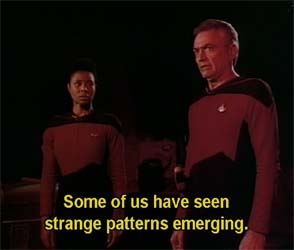 - TNG "Conspiracy", season 1, episode 25
- TNG "Conspiracy", season 1, episode 25
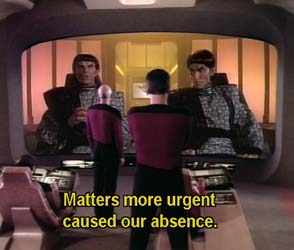 - TNG "the Neutral Zone", season 1, episode 26
- TNG "the Neutral Zone", season 1, episode 26
The final 2 episodes of TNG's 1st season attempted to setup an overarching plot that was never fully realized.
The writers of Next Generation seemed to be trying to move that series in a more serialized direction from a very early time. However, the early attempts were not received well by viewers ("Conspiracy" being a particularly awful episode that is reviled by most fans). Future recurring plot threads were kept fairly restrained. These episodes that represented links in a narrative chain were contained to a handful of episodes each year, with each thread getting 1 or 2 episodes in a season. Serialized storytelling never became a foundational element of Next Generation's writing, and the show remained heavily episodic. It wasn't until Deep Space Nine that the writers and producers made this approach to storytelling work.
With Next Generation getting a total facelife in its third season and really hitting a stride in its fourth, and fifth seasons, the writers of Deep Space Nine seemed to feel more comfortable introducing longer story arcs. Once again, they attempted to introduce a series-long narrative thread in the final episode of the first season, and this time, they stick with it. The second season also starts to introduce sequences of consecutive, serialized episodes with the Bajoran terrorist group "The Circle" in the season 2 premiere "Homecoming". While this storyline is resolved over the first three episodes of season 2, it is a continuation of Vedek Winn's cynical plotting that began in the final episode of season 1 ("In The Hands Of The Prophets" -- one of my favorite episodes), and acts as a setup for Winn's eventual power play to become Kai in the episode "Collaborator" later in the season. From then on, each season of Deep Space Nine has at least one overarching plot.
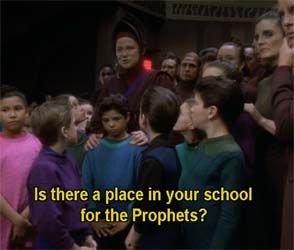 - DS9 "In The Hands Of The Prophets", season 1, episode 20
- DS9 "In The Hands Of The Prophets", season 1, episode 20
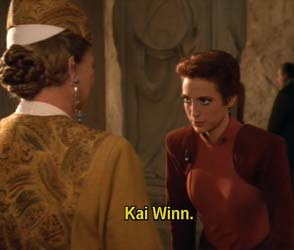 - DS9 "The Collaborator", season 2, episode 24
- DS9 "The Collaborator", season 2, episode 24
Winn's plot to seize power is an overarching thread that runs from the season 1 finale through the end of season 2.
The first episode of season 3 introduces the Jem'Hadar and Founders, which immediately establishes rising tensions throughout the rest of the season (and, in fact, the rest of the series). The thread of the Dominion is picked up later in this season in episodes like "The Abandoned", "Heart of Stone", and "The Adversary".
Last time, I wrote about Deep Space Nine being a full realization of the ideals of Star Trek. Well, Deep Space Nine also ended up being a fuller realization of the apparent desires of the writers of the first season of Next Generation. The idea of Starfleet being compromised by parasitic aliens, which was set up by "Conspiracy" was never realized in Next Generation's following season. Similarly the twin threats established in "The Neutral Zone", of a new threat to both the Federation and Romulan Empires, and the risk of all-out war with the Romulans, were never realized either. The Changelings and Dominion of Deep Space Nine, however, eventually fulfill both of these plans. Changelings do, in fact, infiltrate both Starfleet and the Klingon government, and the threat of the Dominion is more persistent and dangerous than the Romulans ever were in Next Generation.
A dynamic narrative
By the second and third seasons, Deep Space Nine had been established as a much more dynamic narrative compared to The Next Generation. Throughout the series, things change in significant ways, and tensions continue to build from episode to episode. Kai Winn has usurped authority and established an adversarial relationship with Sisko and Kira, seeming to put Bajoran admittance into the Federation in jeopardy. The threat of looming war between the Dominion and Federation is escalating. The Changeling threat has begun creating paranoia within Starfleet and destabilizing seemingly steady alliances.
This has both political ramifications for the universe at large, but also personal ramifications for the characters. For example, as a result of his actions in "The Adversary", Odo is punished by the other Founders by having his defining shape-shifting abilities revoked. He spends half of the fifth season as a "solid".
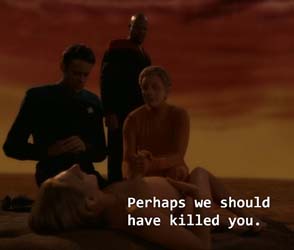 - DS9 "Broken Link", season 4, episode 26
- DS9 "Broken Link", season 4, episode 26
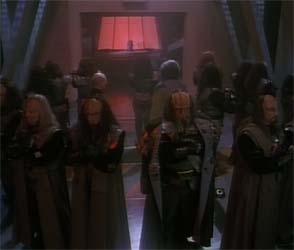 - TNG "Sins Of The Father", season 3, episode 17
- TNG "Sins Of The Father", season 3, episode 17
Odo's excommunication from the Changelings is similar to Worf's discommendation in TNG,
except that it has much more impact on Odo's everyday life.
The closest comparison that I can think of in TNG or Voyager would be Worf's discommendation from the Klingon Empire. However, Worf's discommendation isn't that big of a deal. His discommendation doesn't affect his daily life and pretty much only comes up in the occasional episode in which Worf (or the Enterprise, in general) has to interact with Klingons. And even then, Worf was already kind of exiled and outcast from Klingon culture, being that he was raised by humans on Earth and serves in Starfleet. Other Klingons already looked down upon him, so his discommendation didn't change his relationship to other Klingons all that much. It definitely didn't change his relationships with other characters on the crew. Odo's punishment, however, dramatically alters his every-day life, how the other characters interact with him, and the stories that are told with him.
- DS9 "You Are Cordially Invited", season 6, episode 7
When he joins DS9, Worf becomes a far more interesting
and dynamic character than he ever was in TNG.
Heck, when Worf does show up as a regular cast member midway through DS9's run, even he sees more character development than he saw in the entire 7 seasons of TNG. He is adopted into the House of Martok, is finally forced to reconcile with his failure to raise his son Alexander, and he marries Jadzia Dax, only to have her murdered by Dukat. He's even given command of the Defiant in battle, finally allowing him to live up to his warrior heritage and lifestyle.
Another massive example of the dynamism of DS9's story-telling is how the introduction of Gul Dukat's daughter, Ziyal, and her friendship with Kira, dramatically changes the dynamic between Kira and Dukat. This comes to a head when the station is occupied by the Dominion early in season 6. Ziyal's impact on Dukat may also have started to change audience's perception of Dukat as a character, making him more sympathetic. Ziyal's eventual death sends Dukat completely over the edge into comic book villainy.
This is the sort of thing that can be off-putting for a viewer who isn't keeping up with the show on a weekly basis, back in a time when you couldn't simply load up the episodes you missed on demand. "Wait, what? Odo's human now? When did that happen?" isn't something that could be easily answered back in the day before streaming television and internet wikis.
The Looming Threat
It isn't just character development that keeps Deep Space Nine feeling dynamic. There's also the bigger political changes too. Interference by the Founders leads to a short-lived proxy-war between the Federation and Klingons throughout season four. This arc even includes a short-lived alliance between Sisko and the villain Dukat. The Federation itself begins taking slightly more draconian security measures that impacts the life of civilian back on Earth. And so forth.
From the moment the Jem'Hadar are introduced in the season three premiere, the threat of war is constantly looming and building. The war itself rages for the last two seasons of the series (almost a third of the entire show!) During this war, former villains become heroes, unlikely alliances are forged, Deep Space Nine itself is occupied by the Dominion, Rom loses a leg in battle, Jadzia is killed, and so much more happens. Throughout all of this, the main overarching plot of Sisko coming to terms with his dual identity as a Starfleet captain, and also the Emissary of the Prophets is playing out in the background. Sisko gradually learns how to thread the line and accept the destiny that the Prophets have laid out for him.
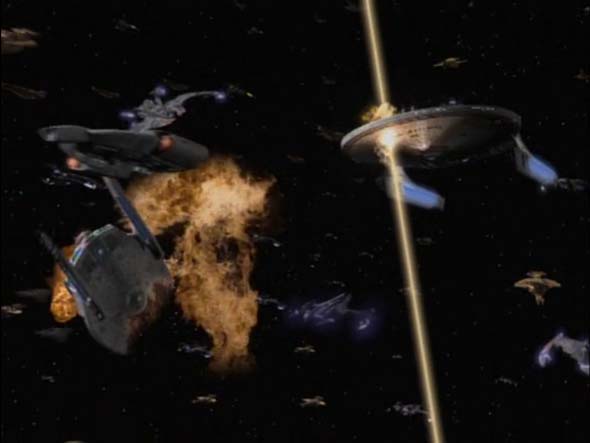 - DS9 "Sacrifice of Angels", season 6, episode 6
- DS9 "Sacrifice of Angels", season 6, episode 6
The threat of looming war hangs over the entire series.
Grounded and prophetic
It isn't just the pioneering serialized format of Deep Space Nine that makes it feel ahead of its time. Deep Space Nine is still extremely poignant to audiences in 2023 because of how grounded and prophetic its stories turned out to be. This show dealt with hot-topic issues that were somewhat fringe or taboo for entertainment at the time, but which have entered the common cultural lexicon due to real-world politics and events. LGBTQ+ identity, terrorism, religious fundamentalism, encroaching totalitarianism, and revisionist history, were all common themes or principle sources of conflict in episodes (or whole seasons) of Deep Space Nine. In the decades since Deep Space Nine's premiere, those subjects have also become recurring topics of the nightly news and casual political punditry.
- DS9 "Homefront", season 4, episode 11
Foreign intervention in democratic processes
comes up several times in DS9.
Episodes like "Homefront" and "Apocalypse Rising" feel like they could have been written today, with our modern fears of foreign terrorists, domestic terrorism, foreign election-tampering, and corporate surveillance. Storylines about the Maquis will also resonate strongly in this era of the Arab Spring and democratic protests in Hong Kong and other countries.
Episodes about Jadzia Dax and Quark's gender-bending in "Profit And Lace" were among some of the earliest examples of gay and trans issues and representation on network television. This was decades before regressive bigots turned trans-gender bathroom and sports bills into battlefields of the culture wars. The plot threads involving Quark's mother, "Moogie", her relationship with the Grand Nagus, and recurring themes of Quark's sexist objectification of his female employees, also mirror the continuing struggles of feminists for equal treatment of women in the #MeToo era.
Workplace and corporate exploitation is also a recurring theme in Ferengi-centric episodes. "Bar Association" is all about the rights of over-worked and under-paid service workers to unionize and collectively bargain for better pay and benefits, with Rom even going so far as to directly quote The Communist Manifesto. This story feels relevant today with unionization efforts at companies like Amazon and Starbucks, and with the risk of union strikes in the public transportation sector, and among school teachers and healthcare workers. And because of the COVID pandemic, the topics of worker benefits such as remote work options have become highly politicized. It also exposes the corporatists' willingness to accept "corporate welfare" (such as tax breaks, bail-outs, and interest-free loans), while staunchly denying such financial relief to the working class as if it were somehow immoral.
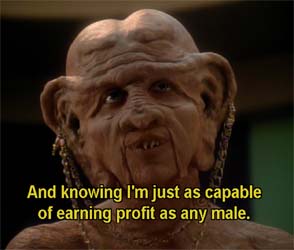 - DS9 "Family Business", season 3, episode 23
- DS9 "Family Business", season 3, episode 23
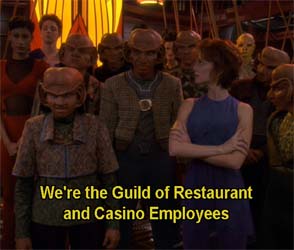 - DS9 "Bar Association", season 4, episode 16
- DS9 "Bar Association", season 4, episode 16
Moogie introduces stories about feminism, and "Bar Association" depicts a unionization effort by Quark's employees.
"In The Hands Of The Prophets" also remains highly relevant to modern audiences. Conservative politicians and religious leaders still challenge the broad scientific consensus regarding anthropogenic climate change, cosmology, virology, and yes, they are even still trying to undercut the teaching of evolution in biology classes. Not to mention burying their heads in the sand regarding the burgeoning sciences behind gender and sexual identity, and their Orwellian attempts to white-wash the way schools teach the United States' history of racism and slavery so that they can continue to perpetuate systemic racism and to avoid taking responsibility for the socio-economic plight of black Americans.
And don't get me started with how disturbingly familiar the ghetto "Sanctuary Districts" of "Past Tense" are starting to appear...
Put simply, modern audiences will likely find a surprising amount of relevant and poignant stories in a binge of Deep Space Nine. Not only do many episodes remain highly topical and relevant in 2023, but a lot of it holds up relatively well. Episodes like "Rejoined", "Melora", and "Profit & Lace" (among others) have their detractors due to some questionable attempts at depicting issues related to trans identity and people with disabilities.
You're free to disagree, but overall, I think that the ease with which colleagues and friends accept Dax's new identity as a woman was extremely forward-thinking for the early 90's, and more than makes up for some other questionable writing decisions. In defense of "Profit & Lace" in particular, even though "Profit & Lace" is played largely for laughs at the expense of Quark's brief stint as a trans woman, Brunt is clearly the bad guy for outing and dead-naming Lumba (Quark's female alter-ego). And at the end, Nilva disregards Brunt's accusation because "[Lumba] is woman enough for me". That's a sentiment that isn't even necessarily mainstream in Progressive circles today in 2023! So even though I understand people's frustration with these less-than-ideal portrayals of marginalized groups, I personally don't think any of those episodes have aged nearly as poorly as some early TNG episodes like "Code Of Honor".
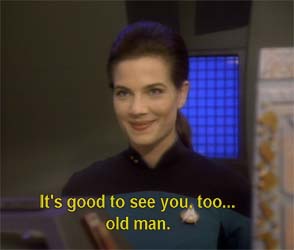 - DS9 "Emissary", season 1, episode 1
- DS9 "Emissary", season 1, episode 1
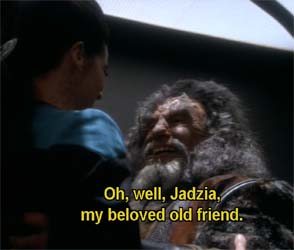 - DS9 "Blood Oath", season 2, episode 19
- DS9 "Blood Oath", season 2, episode 19
Jadzia is readily accepted as a woman by friends and colleagues who knew Curzon.
Put simply, the serialized and politically-polarized nature of Deep Space Nine makes it an absolutely dynamic and relevant TV show by the standards of its contemporaries. the status quo of Deep Space Nine is constantly shifting over the run of the series. The show is constantly changing up the relationships and dynamics between the characters, changing up the political situations, and introducing a revolving door of outstanding recurring guest characters. These changes help to make the show feel more organic and alive, while also broadening the dramatic and narrative possibility space. The stakes are raised, as beloved guest characters are not necessarily under the protection of plot armor. Even our main cast is not immune from having their entire lives turned upside down, nor are they immune from the risk of death.
Deep Space Nine was the first truly "binge-able" Star Trek series, in that the conclusion of one episode will have the audience eager to immediately see what happens next. The Next Generation is a fantastic sci-fi television series that explores high-concept science fiction ideas while also providing compelling human drama. But its individual episodes rarely have lasting consequences for the characters. There are, of course, exceptions. But TNG is basically an anthology of largely unrelated stories that happen to share the same characters. On the other hand, Deep Space Nine, as a whole, tells a single, overarching story about bridging the gaps between cultures, and about how the threat of war can test the principles of even the most idealistic of societies.
Deep Space Nine started doing all of this back in January of 1993, 8 months before the premiere of The X-Files, a full year before Babylon 5, 4 years before Buffy The Vampire-Slayer, 6 years before The Sopranos, and more than a decade before Lost. Though Twin Peaks did have DS9 beat by a couple years. DS9 would go on to cover topics that would become staples of nightly news coverage and internet punditry 3 decades later. Deep Space Nine was truly ahead of its time.